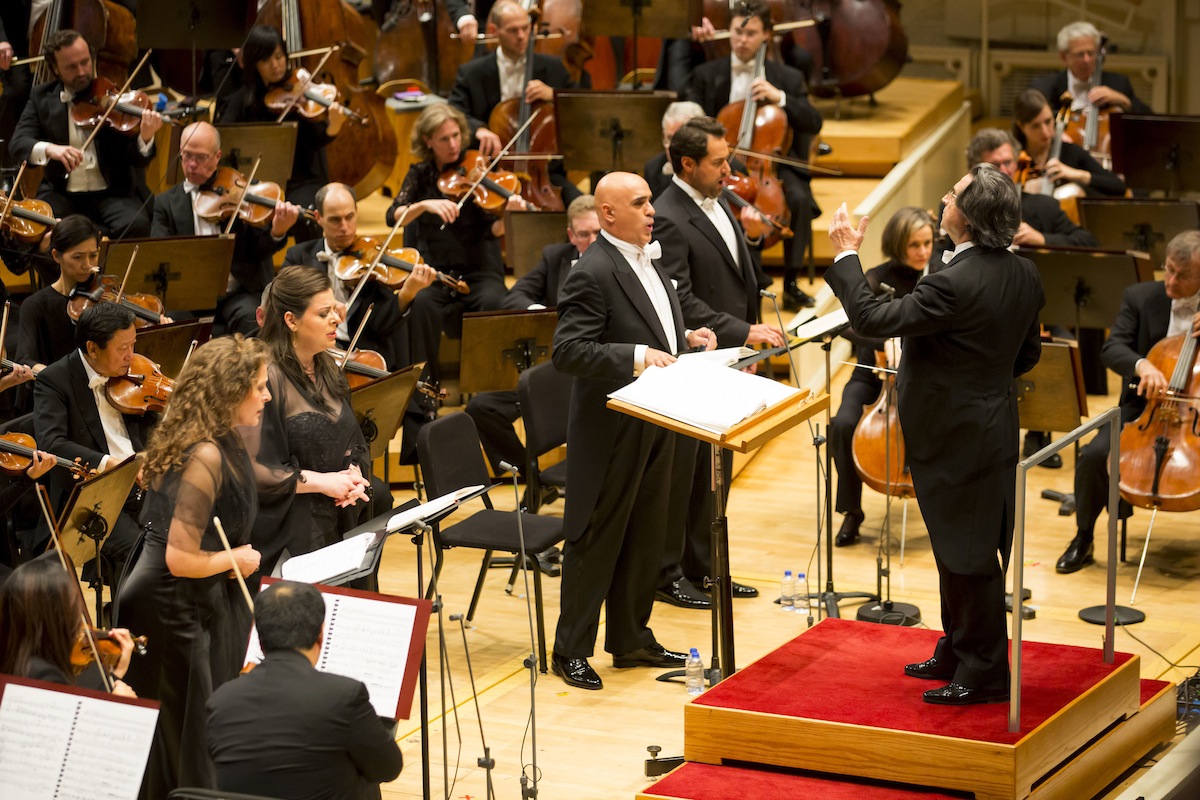Muti, Chicago Symphony mark Verdi’s 200th with a volatile and dramatic Requiem

Riccardo Muti conducts soloists, the Chicago Symphony Orchestra and CSO Chorus in Verdi’s “Requiem” Thursday night at Symphony Center. Photo: Todd Rosenberg
With all the hype and media attention over Thursday’s concert of Verdi’s Requiem by Riccardo Muti and the Chicago Symphony Orchestra on the composer’s 200th birthday, one wondered if there was any conceivable way the actual performance could transcend all the relentless buildup.
Riccardo Muti is not a musician to fail to deliver on high expectations, especially when music of his compatriot Giuseppe Verdi is concerned. The concert, which was streamed live (and free) on the internet to an international audience, provided a terrific exemplar to the world of the remarkable partnership of Muti and the Chicago musicians with this riveting and combustible performance of Verdi’s Requiem mass.
Muti’s skill and deep sympathy and understanding of this music has been a constant throughout his career. He has recorded the Requiem three times, most recently the acclaimed Grammy-winning CSO recording that preceded his music directorship in 2009.
The final event of this fall’s Muti programs marking Verdi’s bicentennial season, this Requiem was largely similar in outline to the performance of four years ago, with the two male soloists, Mario Zeffiri and Ildar Abdrazakov reprising their assignments.
As powerful as that 2009 performance was, Thursday night’s Requiem proved even more volatile and dramatic. The crashing chords, snarling brass and precipitous drop into hell of the choral voices in the “Dies irae” were overwhelming in sonic impact. With sticks in each hand, the CSO’s petite principal percussionist Cynthia Yeh attacked the two bass drums with such force and intensity, one feared she would damage the instruments or herself.
As a unit, the vocal soloists were a notch above the previous quartet. Zeffiri again floated the opening of the “Hostias” with melting sweetness and, after some initial unsteadiness on top, provided vibrant singing throughout. Abdrazakov’s dark and steady bass anchored at the low end with fine solos in “Mors stupebit” and “Confutatis maledictus.”
Mezzo-soprano Daniela Barcellona proved more variable Thursday, singing expressively yet her dusky tone, wide vibrato and cloudy diction too often made words indecipherable.
As anticipated, Tatiana Serjan provided the evening’s solo highlights. As with her acclaimed Lady Macbeth in the CSO’s recent opera performances, the Russian soprano delivered world-class advocacy of her solo part, singing with gleaming tone and bringing an emotional immediacy to every word. For once, the “Libera Me” was the true climax of the Requiem as Verdi intended, Serjan singing beautifully while conveying a desperation, pleading and acceptance that were as eloquent as they were deeply affecting.
The CSO Chorus, 160 strong, did their part with dynamic and flexible corporate vocalism, attacking the “Dies Irae” reprises with a resplendence and almost physical force as well as bringing tonal sensitivity in the more inward moments under Duain Wolfe’s direction.
Presiding over all was Muti who showed once again that he is without peer in this repertory. The CSO’s music director put across the searing drama and psychic desolation of this score as well as the spiritual consolation with a lifetime of understanding, drawing reflexively responsive playing by the orchestra.
Muti will not be back in Chicago until January, but the memory of these extraordinary blazing performances of Verdi’s Requiem and Macbeth will likely keep many Chicagoans warm during the coming winter.